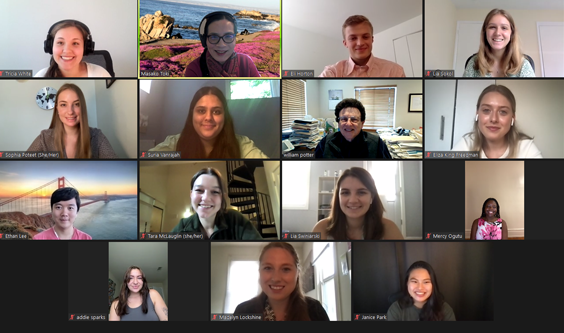June 18, 2021
Masako Toki
The 2021 Summer Undergraduate Nonproliferation Fellowship Program at the James Martin Center for Nonproliferation Studies (CNS) started on June 7th. This is the second year that CNS has conducted the summer program fully online and despite the still challenging online environment necessitated by the ongoing COVID-19 pandemic, CNS continues to enhance youth education and training for a more secure and peaceful world.
This summer, CNS selected 13 outstanding undergraduate fellows with diverse backgrounds from around the country. Each fellow was selected through a rigorous and competitive application process. Participating fellows represent some of the nation’s top schools, including Boston University, Brown University, the College of William and Mary, Cornell University, Middlebury College, Ohio State University, Trinity Washington University, and University of Georgia.
While the majority of fellows are majoring in political science or international affairs, many of the fellows are also double-majoring in, minoring in, or focusing on other fields such as language studies, linguistics, mathematics, anthropology, art history, and film and media culture.
The range of specializations of this year’s undergraduate cohort brings diverse perspectives on issues of nonproliferation and disarmament and continues to enhance the Summer Undergraduate Program as a whole. CNS is eager to incorporate these young creative minds in nonproliferation and disarmament studies.

On the Job Training
During the summer program, fellows receive invaluable job training and work closely with CNS experts on ongoing research and education projects. Fellows also participate in an engaging lecture series that covers issues relating to nonproliferation, disarmament, and arms control. Specific lecture topics include an overview of international nonproliferation regimes, US-Russia nonproliferation issues, and regional proliferation challenges. Scientific aspects of nuclear weapons, current challenges in nuclear disarmament, export controls, open-source tools for nonproliferation, and the media and nonproliferation are topics that are also covered.
In addition to job training and the lecture series, fellows participate in an Arms Control Negotiation Simulation on North Korea’s Nuclear Threats. This simulation not only encourages participatory learning but also develops diplomatic negotiation skills. Furthermore, fellows have the opportunity to undertake an independent research project with mentorship from CNS scholars. The independent research project gives fellows a potential publishing opportunity in a relevant field.
Like many other students, these undergraduate students have been navigating through the online education environment since the start of the pandemic. While the online learning experience has imposed restrictions on all learners to varying degrees, these students have acquired valuable skills and knowledge in how to fully participate in online discussions. Despite challenges, all fellows actively engage in discussions both synchronously and asynchronously.
CNS continues to effectively train future leaders to combat the spread of weapons of mass destruction by rethinking the possibilities of communication and learning despite challenging circumstances. CNS remains steadfast to our commitment to nonproliferation and disarmament education.
About the CNS Undergraduate Program
As a part of efforts to promote nonproliferation education among the next generation, CNS started the Summer Undergraduate Fellowship Program in 1997. Since then, fellows have come from a variety of academic majors. The program accepts highly qualified international students and runs from early June through late August.
This year’s summer program is funded by the Tom and Sarah Pattison Fund, CV Starr Foundation, the Howard and Anne Morgens Fund, and the Carnegie Corporation of New York.
